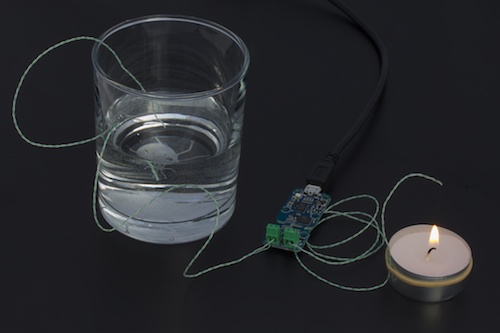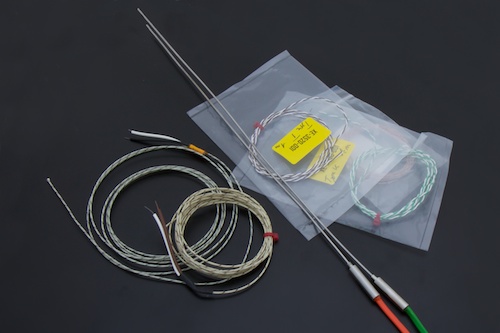![]() This week we are proud to announce the availability of two new products, long awaited by our industrial customers as well as DIYers. The first one, named Yocto-Thermocouple, is a tiny module capable of sensing the temperature at the end of two thermocouple cables, ideal to measure very high and fast-changing temperatures, as well as to measure the temperature of liquids or food for instance. The second one, named Yocto-CO2, measures carbon dioxide in ambiant air and will tell you about the quality of the air you are breathing.
This week we are proud to announce the availability of two new products, long awaited by our industrial customers as well as DIYers. The first one, named Yocto-Thermocouple, is a tiny module capable of sensing the temperature at the end of two thermocouple cables, ideal to measure very high and fast-changing temperatures, as well as to measure the temperature of liquids or food for instance. The second one, named Yocto-CO2, measures carbon dioxide in ambiant air and will tell you about the quality of the air you are breathing.
The Yocto-Thermocouple
So far, we did not have any temperature sensor that you could safely use to measure the temperature of liquids or even humid environments such as soil or food: our board-mounted sensor would quickly get oxidized. In addition, the Yocto-Temperature cannot withstand very high temperature neither, as the sensor chip is not guaranteed to work above 125░C and could even get damaged if you go above 150░C. This is where the Yocto-Thermocouple comes in. By using a thermocouple input instead of a sensor chip, it can work in extreme conditions, up to above 1700░C for instance if you use the proper type of thermocouple !

Thermocouples are very versatile temperature sensors
A thermocouple is a pair of conductors made of two different materials soldered together at one extremity (called the hot end) where you perform the measure. When the temperature at the hot end differs from the temperature at the other end, a tiny voltage appears between the conductors, which can be used to compute the difference of temperature. By adding it to the reference temperature measured on the board, the Yocto-Thermocouple can tell the absolute temperature at the hot end. Although the resulting measure is not as precise as the reference chip, it has the additional advantage of being very reactive to fast temperature changes (a fraction of a second), since the hot end inertia is small.

Various types of thermocouples
There are many types of thermocouples available, with different properties such as sensitivity, inertness, resistance to heat, cold and magnetic characteristics. For a given type of thermocouple, you will find several packaging which may affect its range of use as well. For instance, for the most common type K, you will need at fiberglass isolation instead of PFTE or PFA if you want to go above 270░C, or even mineral insulated thermocouples to move the upper limit from 350-400░C to 1000░C. Be aware that the price of the thermocouple will move up with the temperature limit. In any case, you will not have to buy another USB sensor: the Yocto-Thermocouple should be able to handle all thermocouples that you can buy. One last advice: if you want to measure the temperature on a non-floating electrical conductor, make sure to use an electrically-isolated thermocouple, since there is no galvanic isolation between your USB module and the thermocouple input.
The Yocto-CO2
Away from extreme environments, the Yocto-CO2 comes in to help you monitor your regular ambiant air quality. Although carbon dioxide is only one of the volatile organic components mixing with oxygen in ambiant air, it is the one that can be best measured precisely, and is generally recognized as a good indicator of the overall air quality. The sensor used in this device uses non-dispersive infra-red absorption (NDIR), and requires no maintenance. It provide precise measurements already within the first minute after power on. Thus, this device is ideal to precisely monitor the air quality in residential, commercial and industrial spaces, as well as potentially dusty air ducts used in HVAC (Heating Ventilation and Air Conditioning) systems.
The expected CO2 concentration in fresh air varies between 360 and 390 ppm depending on the location. Industry consensus standard rate maximal admissible CO2 between 1'000 and 2'500 ppm in ventilated buildings. Around 10'000 ppm, some people feel dizziness. The standard version of this sensor is capable to measure up to 10'000 ppm (vol), or 1%.

The CO2 sensor can tell you if it is worth breathing... or not
The same device can be built with a 30'000 ppm sensor (3%) on demand, at a higher price but without minimal quantity. The 300'000 version (30%), based on SenseAir K-33 sensor, can be built on demand for orders of 100 pieces or more.


